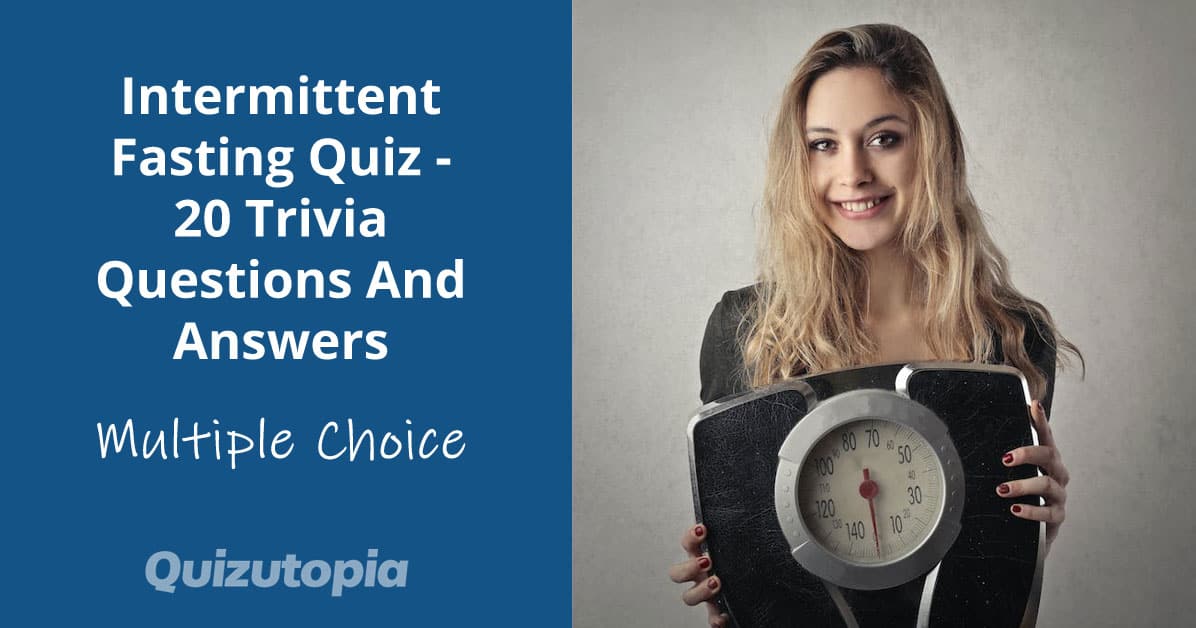Intermittent fasting is a popular dieting trend that involves periods of fasting and eating. It has gained widespread popularity in recent years as a way to lose weight, improve health, and increase longevity.
In this trivia quiz, we’ve compiled 20 questions and answers that test your knowledge of intermittent fasting. From the different types of intermittent fasting to its benefits and potential risks, this quiz covers a range of topics related to this dieting strategy.
So whether you’re a seasoned intermittent faster or just curious about the trend, get ready to put your knowledge to the test and take on this trivia quiz on intermittent fasting.

Subscribe to our mailing list to receive FREE exclusive quizzes and offers!
- What is the primary purpose of intermittent fasting?
- Curing diseases
- Increased muscle mass
- Higher energy levels
- Weight loss and improved metabolic health
The correct answer is Weight loss and improved metabolic health.
Intermittent fasting is a dietary pattern that cycles between periods of fasting and eating, primarily for weight loss and improved metabolic health. - What is the most common form of intermittent fasting?
- Alternate Day Fasting
- 16/8 method
- Eat Stop Eat
- 5:2 method
The correct answer is 16/8 method.
The 16/8 method involves fasting for 16 hours and eating within an 8-hour window each day. - Which of the following is NOT a benefit of intermittent fasting?
- Reduced inflammation
- Improved insulin sensitivity
- Increased human growth hormone
- Increased risk of nutrient deficiencies
The correct answer is Increased risk of nutrient deficiencies.
Intermittent fasting has many benefits, but it may increase the risk of nutrient deficiencies if not followed carefully. - Which hormone is reduced during fasting, helping with weight loss?
- Insulin
- Cortisol
- Ghrelin
- Leptin
The correct answer is Insulin.
Reduced insulin levels during fasting help facilitate weight loss by allowing the body to access stored fat for energy.
- What is the primary fuel source during fasting?
- Alcohol
- Stored body fat
- Protein
- Carbohydrates
The correct answer is Stored body fat.
During fasting, the body switches from using glucose to using stored body fat as its primary fuel source. - Which hormone increases during fasting, promoting muscle growth and fat loss?
- Insulin
- Human growth hormone
- Leptin
- Cortisol
The correct answer is Human growth hormone.
Human growth hormone increases during fasting, promoting muscle growth and fat loss. - Which of the following is NOT a recommended beverage during fasting?
- Water
- Black coffee
- Fruit juice
- Green tea
The correct answer is Fruit juice.
Fruit juice contains sugar and calories, which can break the fast. Stick to water, black coffee, and green tea during fasting periods. - What is a potential side effect of intermittent fasting?
- Increased energy
- Hunger
- Decreased mental clarity
- Reduced appetite
The correct answer is Hunger.
Hunger is a common side effect of intermittent fasting, especially when first starting the practice. - Which of the following populations should NOT practice intermittent fasting?
- Overweight individuals
- Healthy adults
- Pregnant women
- Athletes
The correct answer is Pregnant women.
Pregnant women should not practice intermittent fasting, as they require consistent nutrition for the health of the developing fetus. - How long does it typically take for the body to enter a fasted state?
- 8-12 hours
- 4-6 hours
- 2-4 hours
- 6-8 hours
The correct answer is 8-12 hours.
It takes about 8-12 hours for the body to enter a fasted state after the last meal.
- What is the primary difference between intermittent fasting and calorie restriction?
- Intermittent fasting requires complete abstinence from food
- Calorie restriction does not result in weight loss
- Intermittent fasting focuses on when you eat, not how much
- Calorie restriction involves eating smaller meals throughout the day
The correct answer is Intermittent fasting focuses on when you eat, not how much.
Intermittent fasting is a pattern of eating that focuses on the timing of meals, while calorie restriction focuses on reducing the total number of calories consumed. - Which of the following activities is permitted during fasting periods?
- Exercise
- Sleep
- Meditation
- All of the above
The correct answer is All of the above.
Exercise, meditation, and sleep are all permitted during fasting periods, as they do not interfere with the fasting process. - Which type of intermittent fasting involves eating normally for five days and restricting calories for two days?
- Eat Stop Eat
- Alternate Day Fasting
- 5:2 method
- 16/8 method
The correct answer is 5:2 method.
The 5:2 method involves eating normally for five days and restricting calories to 500-600 per day for two non-consecutive days. - What is the primary reason people choose intermittent fasting over other weight loss methods?
- Increased muscle mass
- Faster weight loss
- Reduced hunger
- Simplicity and flexibility
The correct answer is Simplicity and flexibility.
Intermittent fasting is popular due to its simplicity and flexibility, as it allows individuals to choose a fasting schedule that works best for their lifestyle.
- How does intermittent fasting affect cellular repair processes?
- It has no effect on cellular repair
- It decreases autophagy
- It increases autophagy
- It damages cells
The correct answer is It increases autophagy.
Intermittent fasting increases autophagy, a cellular repair process that helps remove damaged components and promote overall health. - Which of the following is a potential long-term risk of intermittent fasting?
- Reduced risk of cancer
- Improved insulin sensitivity
- Increased risk of heart disease
- Decreased bone density
The correct answer is Decreased bone density.
Long-term intermittent fasting may lead to decreased bone density, especially if nutrient intake is not carefully monitored. - Which type of intermittent fasting involves eating only one meal per day?
- Alternate Day Fasting
- 5:2 method
- OMAD (One Meal A Day)
- 16/8 method
The correct answer is OMAD (One Meal A Day).
OMAD (One Meal A Day) is a type of intermittent fasting that involves eating only one meal per day, typically within a one-hour window. - What is the primary reason intermittent fasting may not be suitable for everyone?
- Different individual metabolic responses
- Inability to lose weight
- Lack of scientific evidence
- Increased risk of nutrient deficiencies
The correct answer is Different individual metabolic responses.
Intermittent fasting may not be suitable for everyone due to different individual metabolic responses and personal preferences. - Which of the following is NOT a potential benefit of intermittent fasting for athletes?
- Increased fat oxidation
- Improved endurance
- Increased muscle mass
- Reduced recovery time
The correct answer is Increased muscle mass.
Intermittent fasting may not lead to increased muscle mass for athletes, as it primarily focuses on weight loss and improved metabolic health.
- What is the primary reason some people experience headaches during intermittent fasting?
- Low blood sugar
- Lack of caffeine
- Dehydration
- Increased stress
The correct answer is Dehydration.
Headaches during intermittent fasting are often due to dehydration, as individuals may not consume enough water during fasting periods.









